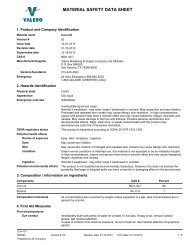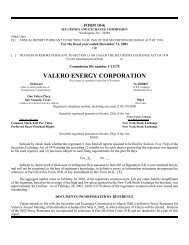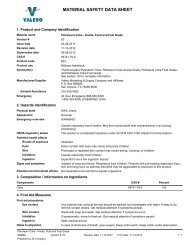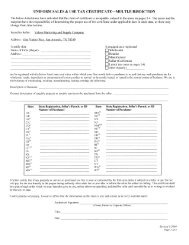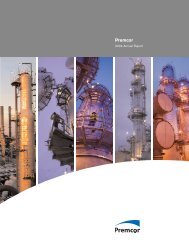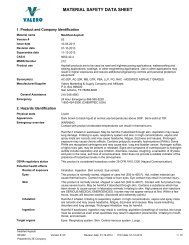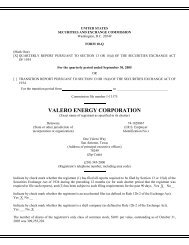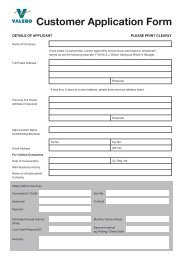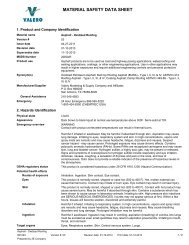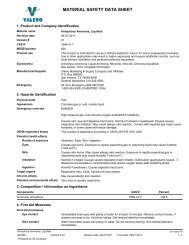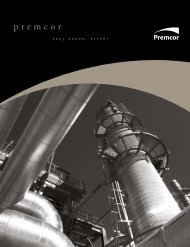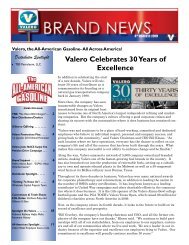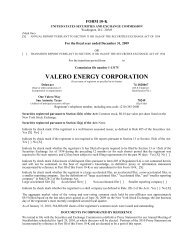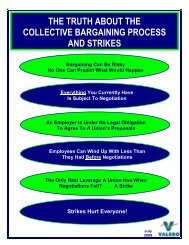Excellence Refined - 30 Years - Valero
Excellence Refined - 30 Years - Valero
Excellence Refined - 30 Years - Valero
You also want an ePaper? Increase the reach of your titles
YUMPU automatically turns print PDFs into web optimized ePapers that Google loves.
Tough Times Build<br />
A Stronger Future<br />
Senior Vice President of Finance Ed Benninger (left) stands with Bill Greehey<br />
before the bulletin board of the NYSE ceremonies on March 26, 1987. <strong>Valero</strong><br />
used proceeds from the formation of a limited partnership to solidify the<br />
company’s finances.<br />
time getting rid of the debt-ridden refinery …” Naysayers<br />
in the media and elsewhere predicted that success was<br />
simply not possible, especially for a company with no<br />
refining experience. But <strong>Valero</strong> had done its homework<br />
and knew refining low-cost feedstocks was a niche market<br />
at the time that had yet to be filled. Feeling the surge of<br />
a strong environmental movement, <strong>Valero</strong>’s leaders knew<br />
unleaded gasoline and other high-grade, premium fuels<br />
were the future. Environmentalists continually urged the<br />
energy sector to stop using high-sulfur resid in industrial<br />
fuel, which would lower the feedstock cost.<br />
But for all the optimism, <strong>Valero</strong> was not immune to the<br />
realities of oil refining and its market volatility. Former<br />
<strong>Valero</strong> President Palmer Moe – who joined the company<br />
in 1983 after serving customers’ interests in the LoVaca<br />
settlement days – recalled dark times in the mid-1980s.<br />
Saber losses were soaring at $250,000 a day, and stocks<br />
were on the slide. But equally clear in Moe’s memory<br />
was the resilience of <strong>Valero</strong> employees. “The refinery was<br />
really in trouble, and the company came close to the line<br />
in terms of potential problems financially,” Moe said in<br />
2005. “I think what brought us through all of that were<br />
the people … people just worked a little harder. Everyone<br />
maintained a positive attitude. Through the very<br />
difficult times, we kept at the problems we were facing<br />
and didn’t give up.”<br />
To shore up its balance sheet, <strong>Valero</strong> formed a joint<br />
venture in February 1985 with a subsidiary of InterNorth<br />
when it sold a 50 percent interest in <strong>Valero</strong>’s West Texas<br />
pipeline for $81 million. The sale helped <strong>Valero</strong> dispose of<br />
excess capacity and reduce debt. And because InterNorth<br />
was a national pipeline company, <strong>Valero</strong> also was able<br />
to increase its revenue through the additional volumes<br />
of gas moving through the pipeline. A short time later,<br />
InterNorth acquired Houston Natural Gas and paid<br />
<strong>Valero</strong> another $23 million to leave the partnership – a<br />
Bill Greehey surveys the Corpus Christi Refinery with facility manager<br />
George Kain.<br />
The problem for most refiners, however, was the expense<br />
involved in transforming such low-grade feedstock into<br />
premium products. But <strong>Valero</strong> viewed the challenge as<br />
an opportunity and found the best experts and the best<br />
technology in the field to help the company make clean<br />
fuel products from the heaviest sour feedstock. Profits<br />
were possible, the company believed, if the equipment<br />
and climate were right. <strong>Valero</strong> wasn’t investing in the here<br />
and now; it was preparing for the future.<br />
A Company Is Born<br />
10




